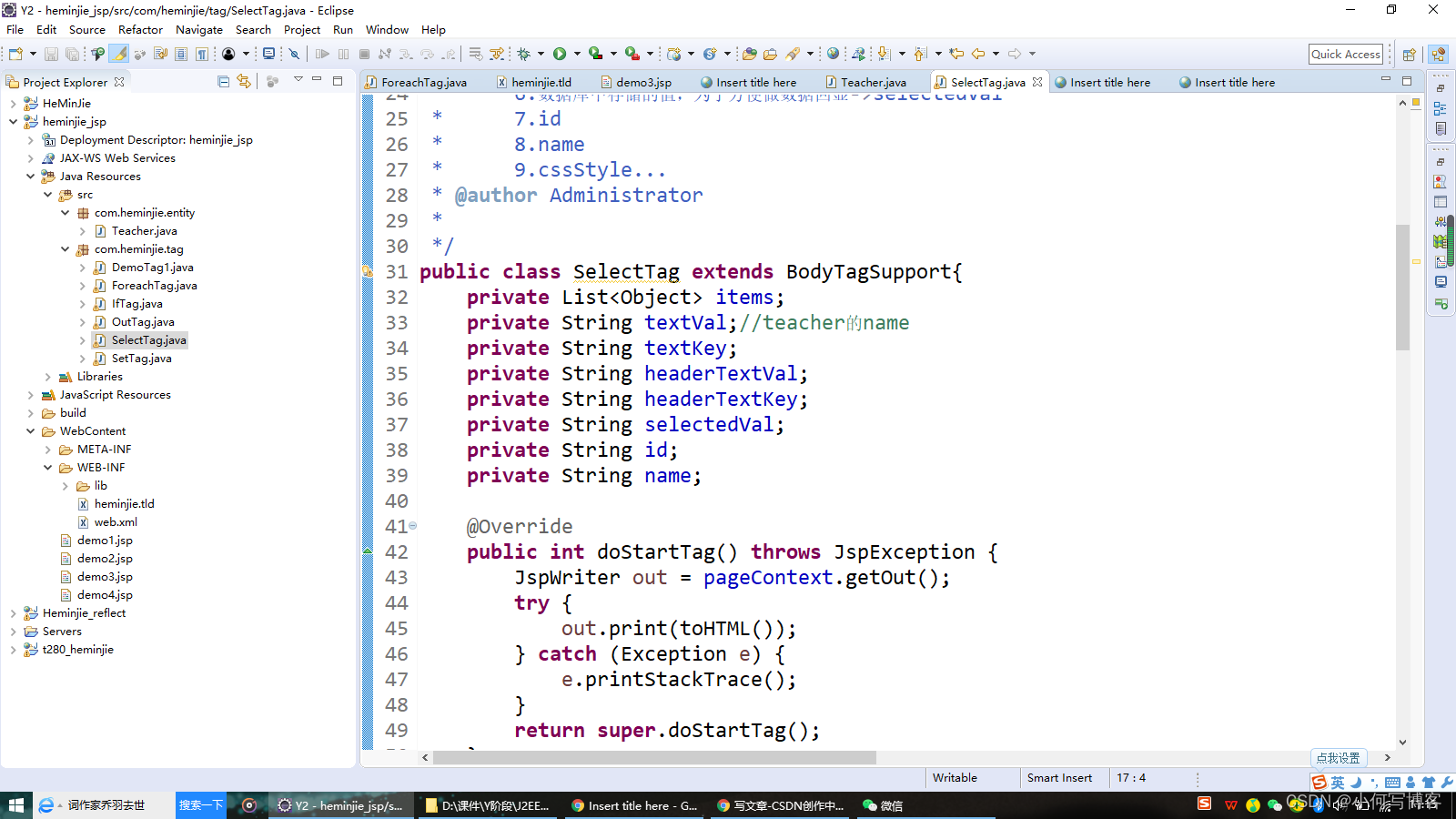目录
思维导图
一、foreach标签
先上我们今天已经写好的tld
<?xml version="1.0" encoding="UTF-8" ?>
<taglib xmlns="http://java.sun.com/xml/ns/j2ee"
xmlns:xsi="http://www.w3.org/2001/XMLSchema-instance"
xsi:schemaLocation="http://java.sun.com/xml/ns/j2ee http://java.sun.com/xml/ns/j2ee/web-jsptaglibrary_2_0.xsd"
version="2.0">
<description>JSTL 1.1 core library</description>
<display-name>JSTL core</display-name>
<tlib-version>1.1</tlib-version>
<short-name>z</short-name>
<uri>http://jsp.hmj.cn</uri>
<validator>
<description>
Provides core validation features for JSTL tags.
</description>
<validator-class>
org.apache.taglibs.standard.tlv.JstlCoreTLV
</validator-class>
</validator>
<tag>
<!-- 代表标签库的名字 -->
<name>demo1</name>
<!-- 该标签对应的助手类 -->
<tag-class>com.heminjie.tag.DemoTag1</tag-class>
<!-- 代表是一个JSP标签 -->
<body-content>JSP</body-content>
<!-- <attribute> -->
<!-- 该自定义jsp标签的属性名称 -->
<!-- <name>var</name> -->
<!-- 该属性是否必填 -->
<!-- <required>false</required> -->
<!-- 该属性值是否支持表达式 -->
<!-- <rtexprvalue>false</rtexprvalue> -->
<!-- </attribute> -->
</tag>
<tag>
<!-- 代表标签库的名字 -->
<name>if</name>
<!-- 该标签对应的助手类 -->
<tag-class>com.heminjie.tag.IfTag</tag-class>
<!-- 代表是一个JSP标签 -->
<body-content>JSP</body-content>
<attribute>
<name>test</name>
<required>true</required>
<rtexprvalue>true</rtexprvalue>
</attribute>
</tag>
<tag>
<!-- 代表标签库的名字 -->
<name>set</name>
<!-- 该标签对应的助手类 -->
<tag-class>com.heminjie.tag.SetTag</tag-class>
<!-- 代表是一个JSP标签 -->
<body-content>JSP</body-content>
<attribute>
<name>var</name>
<required>true</required>
<rtexprvalue>false</rtexprvalue>
</attribute>
<attribute>
<name>value</name>
<required>true</required>
<rtexprvalue>true</rtexprvalue>
</attribute>
</tag>
<tag>
<!-- 代表标签库的名字 -->
<name>out</name>
<!-- 该标签对应的助手类 -->
<tag-class>com.heminjie.tag.OutTag</tag-class>
<!-- 代表是一个JSP标签 -->
<body-content>JSP</body-content>
<attribute>
<name>value</name>
<required>true</required>
<rtexprvalue>true</rtexprvalue>
</attribute>
</tag>
<tag>
<!-- 代表标签库的名字 -->
<name>for</name>
<!-- 该标签对应的助手类 -->
<tag-class>com.heminjie.tag.ForeachTag</tag-class>
<!-- 代表是一个JSP标签 -->
<body-content>JSP</body-content>
<attribute>
<name>items</name>
<required>true</required>
<rtexprvalue>true</rtexprvalue>
</attribute>
<attribute>
<name>var</name>
<required>true</required>
<rtexprvalue>false</rtexprvalue>
</attribute>
</tag>
<tag>
<!-- 代表标签库的名字 -->
<name>select</name>
<!-- 该标签对应的助手类 -->
<tag-class>com.heminjie.tag.SelectTag</tag-class>
<!-- 代表是一个JSP标签 -->
<body-content>JSP</body-content>
<attribute>
<name>items</name>
<required>true</required>
<rtexprvalue>true</rtexprvalue>
</attribute>
<attribute>
<name>textVal</name>
<required>true</required>
<rtexprvalue>false</rtexprvalue>
</attribute>
<attribute>
<name>textKey</name>
<required>true</required>
<rtexprvalue>false</rtexprvalue>
</attribute>
<attribute>
<name>headerTextVal</name>
<required>false</required>
<rtexprvalue>false</rtexprvalue>
</attribute>
<attribute>
<name>headerTextKey</name>
<required>false</required>
<rtexprvalue>false</rtexprvalue>
</attribute>
<attribute>
<name>selectedVal</name>
<required>false</required>
<rtexprvalue>true</rtexprvalue>
</attribute>
<attribute>
<name>id</name>
<required>false</required>
<rtexprvalue>false</rtexprvalue>
</attribute>
<attribute>
<name>name</name>
<required>false</required>
<rtexprvalue>false</rtexprvalue>
</attribute>
</tag>
</taglib>
今天要用到的实体类
package com.heminjie.entity;
public class Teacher {
private String tid;
private String name;
public String getTid() {
return tid;
}
public void setTid(String tid) {
this.tid = tid;
}
public String getname() {
return name;
}
public void setname(String name) {
this.name = name;
}
public Teacher(String tid, String name) {
super();
this.tid = tid;
this.name = name;
}
public Teacher() {
// TODO Auto-generated constructor stub
}
}
分析:
items是一个集合
var是一个String类型的
ForTag类:

完整代码
package com.heminjie.tag;
import java.util.Iterator;
import java.util.List;
import javax.servlet.jsp.JspException;
import javax.servlet.jsp.tagext.BodyTagSupport;
/**
* <c:forEach items="${clas12}" var="c">
* 分析会有两个属性:
* items:List<Object>
* var:String
* 分析线路:
* 第二条:eval_body_include
* 第三条:eval_body_again
* @author Administrator
*
*/
public class ForeachTag extends BodyTagSupport{
private String var;
private List<Object> items;
public String getVar() {
return var;
}
public void setVar(String var) {
this.var = var;
}
public List<Object> getItems() {
return items;
}
public void setItems(List<Object> items) {
this.items = items;
}
@Override
public int doStartTag() throws JspException {
Iterator<Object> it = items.iterator();
// <option value=" where cid='${c.cid}'">${c.cname}</option>
// var = c,it.next()是集合中某一个对象
// pageContext.setAttribute("c", it.next());
pageContext.setAttribute(var, it.next());
pageContext.setAttribute("it", it); //为了保留迭代时指针现有位置
return EVAL_BODY_INCLUDE;
}
@Override
public int doAfterBody() throws JspException {
Iterator<Object> it =(Iterator<Object>) pageContext.getAttribute("it");
if(it.hasNext()) {
pageContext.setAttribute(var, it.next());
pageContext.setAttribute("it", it);
return EVAL_BODY_AGAIN;
}else {
return EVAL_PAGE;
}
}
}
然后还是继续在我们的demo3写

<%@page import="java.util.ArrayList"%>
<%@page import="com.heminjie.entity.Teacher"%>
<%@page import="java.util.List"%>
<%@ page language="java" contentType="text/html; charset=UTF-8"
pageEncoding="UTF-8"%>
<%@ taglib uri="http://jsp.hmj.cn" prefix="z"%>
<!DOCTYPE html PUBLIC "-//W3C//DTD HTML 4.01 Transitional//EN" "http://www.w3.org/TR/html4/loose.dtd">
<html>
<head>
<meta http-equiv="Content-Type" content="text/html; charset=UTF-8">
<title>Insert title here</title>
<style type="text/css">
#mySelect{
color:red;
}
</style>
</head>
<body>
<!--
1.有标签体的情况下,默认会调用助手类的doStartTag、doAfterBody、doEndTag方法
2.如果将doStartTag的返回值为skip——body,那么doafterbody就不会调用执行(路线1)
3.如果将dostartag的返回值改为EVAL_BODY_INCLUDE,那么doafterbody就会执行(路线2)
4.如果将doAfterBody的返回值改为EVAL_BODY_AGAIN,那么会一直调用doafterbody,进入循环(路线3)
-->
<z:demo1>xx</z:demo1>
<%-- <z:if test="true">true</z:if> --%>
<%-- <z:if test="false">false</z:if> --%>
<%-- <z:set var="name" value="hmj"></z:set> --%>
<%-- <z:out value="${name}"></z:out> --%>
<%
List<Teacher> list = new ArrayList<>();
list.add(new Teacher("t001","zs"));
list.add(new Teacher("t002","李四"));
list.add(new Teacher("t003","老六"));
request.setAttribute("list", list);
%>
<z:for items="${list }" var="t">
${t.tid } : ${t.name }
</z:for>
</body>
</html>二、select标签
* 1.省略遍历的过程
* <z:select></z:select>
* 2.当做数据回显时,无需增加if判断,无需增加新的代码
*
* 分析:
* 1.后台要遍历-->数据源-->items
* 2.需要一个对象的属性代表下拉框的展示内容-->textVal
* 3.需要一个对象的属性代表下拉框的value-->textKey
* 4.默认的头部选项->headerTextVal
* 5.默认的头部选项值->headerTextKey
* 6.数据库中存储的值,为了方便做数据回显->selectedVal
* 7.id
* 8.name
* 9.cssStyle...
SelectTag类
完整代码
package com.heminjie.tag;
import java.lang.reflect.Field;
import java.lang.reflect.InvocationTargetException;
import java.util.List;
import javax.servlet.jsp.JspException;
import javax.servlet.jsp.JspWriter;
import javax.servlet.jsp.tagext.BodyTagSupport;
import org.apache.commons.beanutils.PropertyUtils;
/**
* 1.省略遍历的过程
* <z:select></z:select>
* 2.当做数据回显时,无需增加if判断,无需增加新的代码
*
* 分析:
* 1.后台要遍历-->数据源-->items
* 2.需要一个对象的属性代表下拉框的展示内容-->textVal
* 3.需要一个对象的属性代表下拉框的value-->textKey
* 4.默认的头部选项->headerTextVal
* 5.默认的头部选项值->headerTextKey
* 6.数据库中存储的值,为了方便做数据回显->selectedVal
* 7.id
* 8.name
* 9.cssStyle...
* @author Administrator
*
*/
public class SelectTag extends BodyTagSupport{
private List<Object> items;
private String textVal;//teacher的name
private String textKey;
private String headerTextVal;
private String headerTextKey;
private String selectedVal;
private String id;
private String name;
@Override
public int doStartTag() throws JspException {
JspWriter out = pageContext.getOut();
try {
out.print(toHTML());
} catch (Exception e) {
e.printStackTrace();
}
return super.doStartTag();
}
private String toHTML() throws NoSuchFieldException, SecurityException, IllegalArgumentException, IllegalAccessException, InvocationTargetException, NoSuchMethodException {
StringBuffer sb = new StringBuffer();
sb.append("<select id='"+id+"' name='"+name+"'>");
if(headerTextVal !=null && !"".equals(headerTextVal)) {
sb.append("<option value='"+headerTextKey+"'>"+headerTextVal+"</option>");
}
for (Object obj : items) {
Field textKeyFiled = obj.getClass().getDeclaredField(textKey);
textKeyFiled.setAccessible(true);
Object value = textKeyFiled.get(obj);
if(selectedVal !=null && !"".equals(selectedVal)&& selectedVal.equals(value)) {
sb.append("<option selected value='"+value+"'>"+PropertyUtils.getProperty(obj, textVal)+"</option>");
}else {
sb.append("<option value='"+value+"'>"+PropertyUtils.getProperty(obj, textVal)+"</option>");
}
}
sb.append("</select>");
return sb.toString();
}
public List<Object> getItems() {
return items;
}
public void setItems(List<Object> items) {
this.items = items;
}
public String getTextVal() {
return textVal;
}
public void setTextVal(String textVal) {
this.textVal = textVal;
}
public String getTextKey() {
return textKey;
}
public void setTextKey(String textKey) {
this.textKey = textKey;
}
public String getHeaderTextVal() {
return headerTextVal;
}
public void setHeaderTextVal(String headerTextVal) {
this.headerTextVal = headerTextVal;
}
public String getHeaderTextKey() {
return headerTextKey;
}
public void setHeaderTextKey(String headerTextKey) {
this.headerTextKey = headerTextKey;
}
public String getSelectedVal() {
return selectedVal;
}
public void setSelectedVal(String selectedVal) {
this.selectedVal = selectedVal;
}
public String getId() {
return id;
}
public void setId(String id) {
this.id = id;
}
public String getName() {
return name;
}
public void setName(String name) {
this.name = name;
}
}
然后继续在demo里面写,我还在style里定义了一个红色
<%@page import="java.util.ArrayList"%>
<%@page import="com.heminjie.entity.Teacher"%>
<%@page import="java.util.List"%>
<%@ page language="java" contentType="text/html; charset=UTF-8"
pageEncoding="UTF-8"%>
<%@ taglib uri="http://jsp.hmj.cn" prefix="z"%>
<!DOCTYPE html PUBLIC "-//W3C//DTD HTML 4.01 Transitional//EN" "http://www.w3.org/TR/html4/loose.dtd">
<html>
<head>
<meta http-equiv="Content-Type" content="text/html; charset=UTF-8">
<title>Insert title here</title>
<style type="text/css">
#mySelect{
color:red;
}
</style>
</head>
<body>
<!--
1.有标签体的情况下,默认会调用助手类的doStartTag、doAfterBody、doEndTag方法
2.如果将doStartTag的返回值为skip——body,那么doafterbody就不会调用执行(路线1)
3.如果将dostartag的返回值改为EVAL_BODY_INCLUDE,那么doafterbody就会执行(路线2)
4.如果将doAfterBody的返回值改为EVAL_BODY_AGAIN,那么会一直调用doafterbody,进入循环(路线3)
-->
<z:demo1>xx</z:demo1>
<%-- <z:if test="true">true</z:if> --%>
<%-- <z:if test="false">false</z:if> --%>
<%-- <z:set var="name" value="hmj"></z:set> --%>
<%-- <z:out value="${name}"></z:out> --%>
<%
List<Teacher> list = new ArrayList<>();
list.add(new Teacher("t001","zs"));
list.add(new Teacher("t002","李四"));
list.add(new Teacher("t003","老六"));
request.setAttribute("list", list);
%>
<z:for items="${list }" var="t">
${t.tid } : ${t.name }
</z:for>
<select>
<option value="1">zhangsan</option>
<option value="2">lisi</option>
</select>
<z:select selectedVal="t002" id="mySelect" headerTextKey="-1" headerTextVal="====请选择====" textVal="name" items="${list }" textKey="tid"></z:select>
</body>
</html>效果图
今天分享就到这了,谢谢大家




























 被折叠的 条评论
为什么被折叠?
被折叠的 条评论
为什么被折叠?








